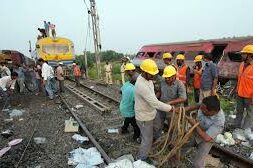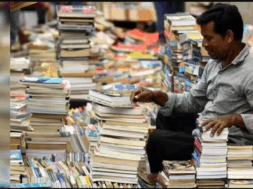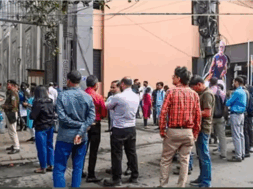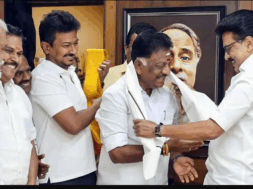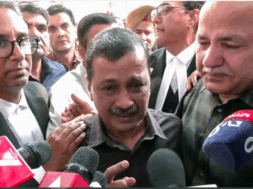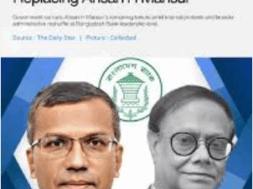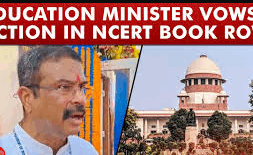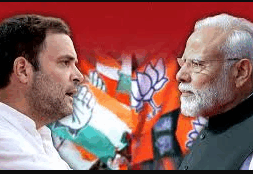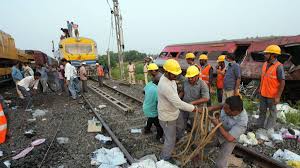
Manas Dasgupta
NEW DELHI, June 6: The Central Bureau of Investigation (CBI) on Tuesday took over the investigation into the horrific 3-train crash on Friday involving Coromandel Express, Yashwantpur-Howrah Express and a goods train in Odisha’s Bahanaga Bazar in Balasore district killing at least 278 people and injuring over 900.
The CBI probe team arrived at the accident site on Tuesday morning and filed a case under various sections of the Indian Penal Code. The Odisha police have filed a case with charges of “causing death by negligence and endangering life” in the train accident.
The CBI has re-registered the case on a reference from the Ministry of Railways and consent of the State government. “A CBI team has reached Balasore to gather evidence,” said an agency official. Earlier, based on a complaint from Assistant Sub-Inspector of Police Papu Kumar Naik, the case was registered at the Balasore Government Railway police station alleging that “negligence” led to the incident.
“Due to collision of 12841 Howrah-Chennai Coromandel Express and 12864 Yashwantpur-Howrah Express, the coaches of both trains overturned, causing death of more than 100 and injuries to several hundreds of passengers. The bodies and injured passengers were shifted to the District Headquarters Hospital, Balasore; the Community Health Centre, Soro and the District Headquarters Hospital, Bhadrak and rescue operation was continuing,” said the FIR.
“At present, culpability of specific railway employees is not ascertained, which will be unearthed during investigation,” it said. On Monday, the Chief Commissioner of Railway Safety, SE Circle, Shailesh Kumar Pathak had visited the spot and spoke to people about the accident as part of his probe.
The reason behind the accident will be known after completion of investigations by CBI and CCRS, an official said, adding that the GRP in Balasore had registered an FIR and is also probing into the accident.
The CBI stepping in is a significant move as officials say only a detailed probe by a top agency can establish criminal tampering, if any, with the point machine or the electronic interlocking system, or if the train changed tracks due to reconfiguration or a signaling error.
Railway officials had earlier indicated that possible “sabotage” and tampering with the interlocking system, which detects the presence of trains, led to the accident involving the Shalimar-Chennai Central Coromandel Express, the Bengaluru-Howrah Superfast Express, and a goods train.
The railways said according to the initial investigation, the accident was the result of a signalling problem and there was no collision. Some railway experts have, however, questioned whether Coromandel Express may have hit the goods train directly inside a “loop line…
A “loop line” divides from the main railway tracks and returns to the mainline after some distance, which helps manage busy rail traffic. Visuals had shown the Coromandel Express’ engine resting on top of the goods train, indicating a straight collision.
The CBI inquiry will focus on answering all queries regarding the accident, the worst in the country in the last two decades. Government sources have said all angles will be investigated, including mechanical error, human error, and sabotage.
The Coromandel Express crashed into a stationary goods train, derailing most of its coaches at 7 p.m. on June 2. A few coaches of Coromandel toppled over the last few coaches of the Bengaluru-Howrah Express which was passing by at the same time. Of the 278 dead persons, 177 bodies have been identified and handed over to their families.
However, even as the ruling BJP urged the opposition parties not to politicise the accident by demanding the resignation of the railway minister, its leader in West Bengal, the Leader of Opposition in the State Assembly Suvendu Adhikari made an atrocious charge against the ruling Trinamool Congress accusing it of having plotted the accident.
Charging that the TMC was behind the Odisha train accident, Adhikari claimed, “This incident [train accident] is TMC’s conspiracy. They are behind the incident. Why have they been panicking so much since yesterday when this incident is of another State? Why are they afraid of Central Bureau of Investigation (CBI) investigation?”
The BJP leader referred to a purported audio clip of a conversation between two Railway officials posted by TMC leader Kunal Ghosh on Twitter on June 4. Adhikari said, “These people with the help of the police tapped the phones of both the railway officials. How did these people know the conversation between two railway officials? How the conversation got leaked? This should come in the CBI investigation. If it doesn’t come, I will go to court.”
Earlier on June 5, stepping up her attack on the Central government, West Bengal Chief Minister Mamata Banerjee slammed the Railway Board’s decision to hand the inquiry into the Odisha train accident over to the CBI saying that “it is not the time to suppress the truth.”
“I also gave Gyaneshwari Express case to CBI but no result came. Twelve years [have passed] but we see no result. The CBI handles criminal and accident cases. The Railway Safety Commission is there,” she remarked. Mamata Banerjee arrived at the accident site in Balasore on June 3 to take stock of rescue operations and questioned why the Centre’s ‘Kavach’ system was missing from the track of the collision. Ms. Banerjee who was the Union Railway Minister last in 2009-2011 during the Congress led UPA-2 regime, termed the incident the “biggest railway accident of the 21st century” and said this would not have happened if Kavach system was present.”
“Coromandel is one of the best express trains. I was the Railway Minister thrice. From what I saw, this is the biggest railway accident of the 21st century. Such cases are handed over to Railway’s safety commission and they investigate and give a report,” she had said.
Meanwhile, the AIIMS hospital in Bhubaneswar has called for at least five freezers from Paradip Port to slow down the decay of the bodies brought in after the horrific three-train crash in Balasore on Friday evening. Even after four days of the accident, over 100 bodies are still to be identified. The officials are debating how much longer the bodies, many of them dismembered and mangled, can be kept for relatives to identify them. To give the families more time, the bodies are being embalmed. Blood samples are also being collected for DNA matching.
A senior doctor from the premier AIIMS hospital, Delhi, said it was “not advisable” to keep damaged bodies too long as even embalming wouldn’t help. A Shariff, the Head of Department, Anatomy, AIIMS, said a body could be preserved “for years” only if the embalming is done correctly, within 12 hours.
“Decomposition depends on a number of factors, including ambient temperature. Bodies are fine for seven-eight hours, even 12 hours, provided the temperature is not too high. Ice and cold storage delay decomposition,” Dr Shariff said.
Grieving families have struggled to identify bodies damaged beyond recognition from a slideshow of images shown to them by officials. “If embalming is not done for more than 12 hours after death, it is not effective and the decomposition is very quick. If the body is damaged, it is very difficult to embalm it. Fluids have to be injected locally. It is not advisable to keep the bodies too long,” Dr Shariff said.
Running out of time, the railways have advised relatives to dial 139 to try and identify people who died.
The AIIMS, Bhubaneswar, received 123 bodies on Sunday. “By the time AIIMS received the bodies, 30 hours had already passed. Our prime objective was to prevent further decay of the bodies. The bodies were kept in cold storage and embalming was done on a war footing,” AIIMS Executive Director Ashutosh Biswas said.
The bodies would be stored in the freezers, said Dr Biswas. Each container – usually meant for shipping fish, meat or other perishable goods – can store 30-40 bodies. He said experts from several hospitals and various cities had arrived to help preserve the bodies.
